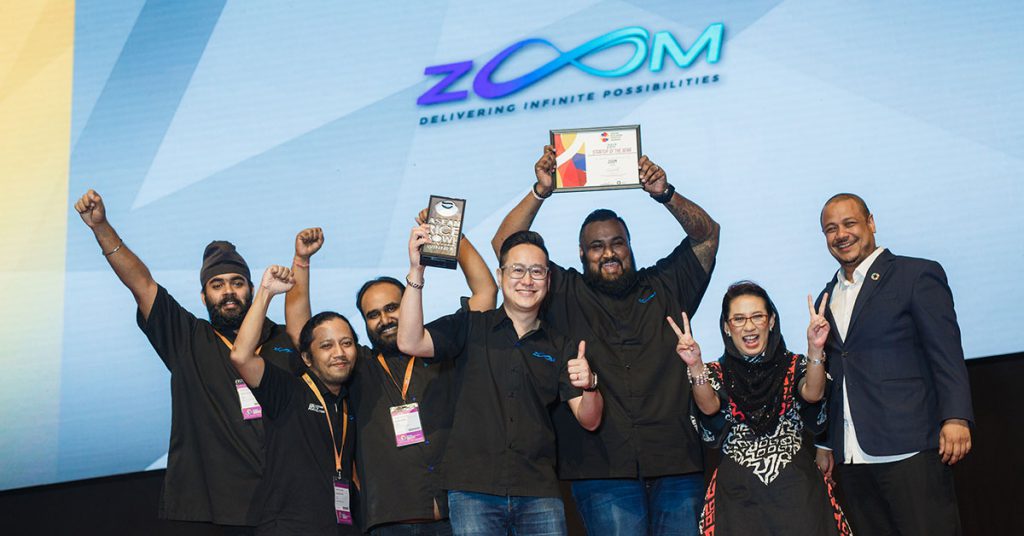- Malaysian startup Zoom has secured RM4 mil in a round of funding, with Gobi Partners the lead investors.
- CEO Jeevan Kumar credits an emphasis on improving their product and platform as the key factor behind Zoom’s success in acquiring funding.
- Future plans include activating Penang and Johor Bahru, as well as expanding to Thailand and Indonesia.
Following their “Best Startup” win at the ASEAN Rice Bowl Awards in December last year, Malaysian B2B delivery platform Zoom just announced their success in acquiring RM4 million during a round of Pre-Series A funding.
Gobi Partners led the investor pool; other investors include Cana Asia Limited, Spiral Ventures Pte Ltd, and Cradle Fund.
Founded in 2016, Zoom provides a web-based platform for businesses to solve their last-mile delivery issues via a system that employs professional riders and deep integration within their clients’ business ecosystems.
Zoom plans to use these newly acquired funds to expand their business to Penang and Johor Bahru while also continuing to improve their services within the Klang Valley. Within the coming year, they also hope to expand to Thailand and Indonesia.
Speaking on their successful funding, CEO of Zoom Jeevan Kumar was happy to provide some insight into his company’s sterling performance in earning recognition and support from investor groups and awards bodies in Malaysia.
Success Through Trial, Error, And Learning
Regarding his company’s success in securing the RM4 million investment, he noted previous attempts (numbering more than 30) to secure funding and the lessons learned through the failed attempts helped them tweak and alter their pitch to make it attractive to potential investors.
“We learned what to do, how to explain our startup to make it attractive to the VCs (venture capitalists), and how to speak the ‘investor language’ through our failed fundraising meets,” Jeevan said. “So when it was time to meet Gobi, we had most of our pitch fine-tuned.”
“I believe the fact that we were operationally profitable by just bootstrapping and us also being the most robust last-mile logistics platform also significantly contributed to Gobi’s interest.”
It also helped that Zoom had among their clientele a long list of businesses that were also investees of Gobi Partners, simplifying the due diligence process considerably.
“We were also lucky because we had secured agreements from Cradle Fund, Spiral Ventures, and Cana Asia Limited who wanted to follow within the same fundraising round,” he added.
“All this added credibility of the total raise.”
When asked about the accolades and recognition that Zoom has so far earned—particularly their recent naming as the best startup at last year’s ASEAN Rice Bowl Awards—Jeevan was humbled and thankful to be able to provide job opportunities to those without tertiary education.
“By the time we were chosen as the finalists, we were already growing significantly month on month,” he said.
“The traction and genuine interest in using technology to provide job opportunities helped us shine through the other finalists.”

On Priorities, And Not Taking ‘No’ For An Answer
Additionally, Jeevan was more than happy to share some of the lessons learned throughout his entrepreneurial journey.
“After having had two years in the industry, I’ve learned that having the best tech in your market vertical and managing your cash flows are the primary ways to run a business and get VCs to invest in you,” he said.
He went on to detail the early days of bootstrapping and how the founders invested their own hard-earned money to build the business and construct its platform to be the best in its market.
“Doing this created customer loyalty,” he explained. “Also better management of every rider on and off the road made it possible for us to scale.”
On the management of cashflow, Jeevan also noted the difficulty of actually sticking to the task while having to deal with the popularity and hype of being a startup founder—what more when sustaining a business without investor funding.
“Since we didn’t have any external funding, we had to make money every month to fund the growth of the company the following month,” he explained.
“This created the discipline of understanding our cash flowing and spending every ringgit we had towards growing the company.”
He also went on to explain that instead of spending funds on marketing, Zoom chooses to spend that money on purely improving their product.
“We spent less than 5% of our total revenue on marketing because we believed that spending our marketing budget on creating the best platform and employee well-being would end up creating more returns,” he said.
“Fortunately, we were proven right as 90% of our new clients are introduced to us by our existing ones.”
“Better still was the fact that our riders on the road introduced Zoom to other riders doing the same job at other companies but earning way less.”
Finally, Jeevan signed off with some sage advice for other business owners seeking investor funding.
“You will get a lot of ‘no’s and rejections when raising funds” he said. “The biggest lesson is to understand that every ‘no’ is actually a ‘not yet’.”
“Take every rejection as a learning opportunity. That’s how one grows as an entrepreneur.”
Also Read: The Former iBilik & Propwall Founder Spills All On His New Prop Startup, Land+
Feature Image Credit: ASEAN Rice Bowl Startup Awards 2017












